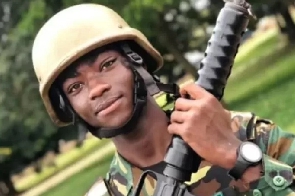The heinous and senseless killing of Sherrif Imoro, a young and promising soldier with the Ghana Armed Forces, is an egregious violation of human rights and a grave injustice that demands the strongest condemnation possible.
It is a shocking reminder of the rampant lawlessness and breakdown of societal order that plagues our communities, and it is imperative that we take swift and decisive action to bring the perpetrators of this vile act to justice.
Furthermore, the response of some members of the military who launched an attack on innocent residents in a misguided attempt to find the culprits is a flagrant violation of basic human rights and a dangerous escalation of the situation. Such egregious actions only serve to exacerbate the tensions and instigate further unrest in our communities, and they must be met with swift and severe consequences. The killing of Sheriff Moro is not an isolated incident, but rather a part of a disturbing trend of attacks on military personnel in Ghana in recent years.
The brutal lynching of Captain Maxwell Adam Mahama in 2017 serves as a stark reminder of the perilous environment in which our brave soldiers operate, and the urgent need for robust measures to address the root causes of such violence and ensure that the perpetrators face justice. We cannot tolerate the prevailing culture of violence and lawlessness in our society, where individuals feel empowered to take matters into their own hands and resort to barbaric acts of violence to settle disputes.
This flagrant disregard for the rule of law and human dignity undermines the very fabric of our society and poses a severe threat to the safety and security of our communities. It is our collective responsibility to uphold the rule of law and protect the fundamental rights of all individuals, regardless of their profession or social status. Therefore, it is essential that the government takes concrete steps to address the root causes of such violence, including improving the security infrastructure and strengthening law enforcement agencies.
It is also crucial that the military is properly trained and equipped to deal with such situations, without resorting to excessive use of force or vigilante justice. In addition to these measures, there must also be a concerted effort to promote dialogue and understanding between different communities and to address the underlying social and economic factors that contribute to such violence. This requires a holistic approach that involves all stakeholders, including civil society organizations, religious and community leaders, and the media.
Finally, we must recognize and honour the sacrifice of soldiers like Sheriif Moro, who risk their lives every day to protect our nation and safeguard our freedoms. Their dedication and service to our country should never be taken for granted, and we must do everything in our power to ensure that they are protected and supported in their noble mission.
In conclusion, the killing of Sherrif Imoro is a tragic reminder of the urgent need to address the pervasive culture of violence and lawlessness in our society. We must come together as a nation to condemn such acts and take decisive action to ensure that justice is served and that such heinous crimes are not repeated in the future.
Opinions of Tuesday, 9 May 2023
Columnist: Kwame Takyi Danquah



















